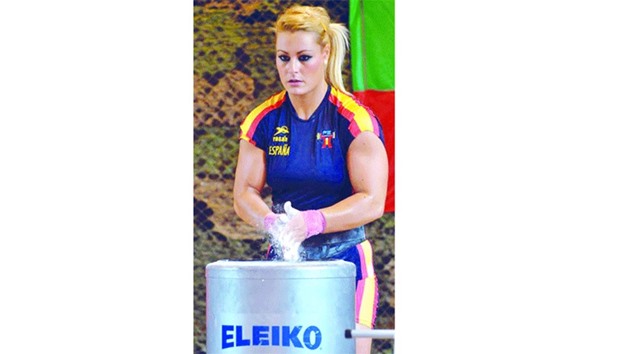Spanish weightlifter Lidia Valentin hopes to be awarded an Olympic gold medal from London 2012 after the athletes that finished above her all failed drug tests when their samples were reanalysed. Valentin, who will compete at next month’s Games in Rio, finished fourth in 2012 in the Women’s -75kg category.
All three athletes that made the podium ahead of Valentin — champion Svetlana Podobedova, silver medallist Nataliya Zabolotnaya and Iryna Kulesha who won bronze — tested positive for banned substances when their samples were reanalysed.
“Although late, as it has taken four years, finally justice has been done,” Valentin told Spanish newspaper AS. “The important thing is that is has come out. It’s not a surprise.”
The International Weightlifting Federation (IWF) announced on Wednesday that Russia’s Zabolotnaya and Kulesha of Belarus had produced positive samples in a second wave of International Olympic Committee (IOC) retests.
The IWF said last month that the sample of Kazakhstan’s Podobedova had produced an adverse finding in the first wave of retests. “I wasn’t able to enjoy the podium at the time but the important thing is that the cheaters have been caught,” the 31-year-old Valentin said.
The IOC stores samples for a decade in order to re-test using newer methods or to look for new drugs. The results are part of the IOC’s re-testing of samples from past Games to keep cheats from competing at the Rio de Janeiro Olympics in August.
Podobedova, Zabolotnaya and Kulesha have been provisionally suspended by the IWF and the Spanish Weightlifting Federation (Fedehalter) hope Valentin will be belatedly awarded the gold medal prior to the start of the Rio Games on Aug. 5.
Valentin hopes that retrospective testing serves as a strong deterrent to athletes that may consider cheating in Rio. “I hope this sends a clear message that in Rio all athletes should be clean and no one considers cheating,” she said.
The three were among six six weightlifting medallists from the London Olympics, including three Russians, who tested positive while it was re-examined.
A total of 11 lifters were provisionally suspended for returning positive tests, including another five who did not win medals in London, the International Weightlifting Federation (IWF) added in a statement.
They were among 45 athletes the International Olympic Committee said last week had been caught in a second wave of testing on samples stored from the 2008 and 2012 Games.
Over 100 Russian athletes have so far been banned from the Games after the World Anti-Doping Agency uncovered an elaborate doping system directed by Russia’s sports ministry across more than 30 sports.
The banned London weightlifting silver medallists, named for the first time by the IWF, were Russians Alexandr Ivanov, Nataliya Zabolotnaya and Svetlana Tzarukaeva. The bronze medallists were Iryna Kulesha of Bulgaria, Armenia’s Hripsime Khurshudyan and Cristina Iovu of Moldova. In total, 13 weightlifting medals won in London have now been tainted by doping, comprising four gold, four silver and five bronze. The doping tally from weightlifting at the 2008 Beijing Games stands at five — one gold, two silver and two bronze. More positives are possible from both events.
In a bid to clean up the sport for the Rio Olympics, the IWF has barred the entire Bulgarian team for repeated doping offences and warned Russia, Kazakhstan and Belarus they could face the same fate. In addition, the IWF has punished North Korea, Romania, Azerbaijan, Uzbekistan and Moldova by reducing the allocation of lifters they can send to Rio.

Spanish weightlifter Lidia Valentin
